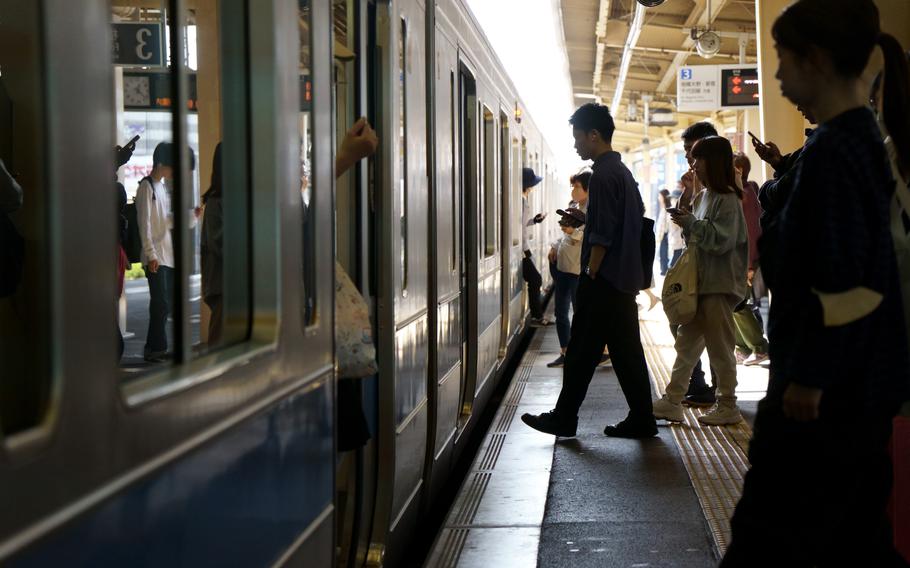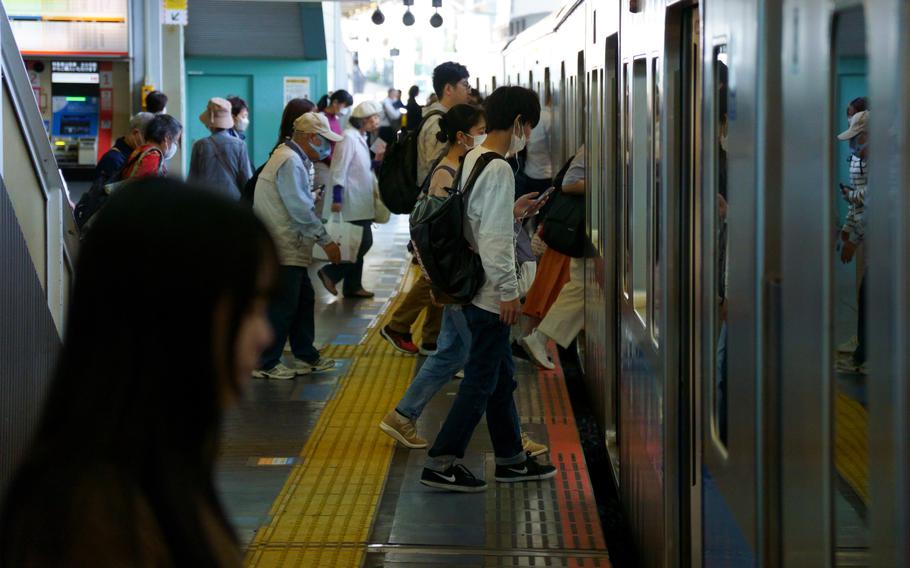
Commuters board a train in Tokyo, Thursday, Oct. 19, 2023. (Akifumi Ishikawa/Stars and Stripes)
TOKYO — It may soon become more expensive to ride one of Japan’s famously crowded trains thanks to measures recently approved by lawmakers to combat the side effects of “over-tourism.”
Visitors have been pouring into Japan ever since tight COVID-19 restrictions on foreign travelers were relaxed in October 2022. More than 2.18 million people came in September, just short of the 2.27 million who visited in September 2019, before the pandemic, according to the Japan National Tourism Organization.
But the flood of tourists is raising concerns, Prime Minister Fumio Kishida said during a meeting Wednesday with the Ministerial Council in Tokyo.
“There are concerns that excessive crowds and bad manners in some areas and during certain times of the day are affecting the lives of local residents and reducing tourist satisfaction,” Kishida said at the meeting, according to the Prime Minister’s Office’s website.

Commuters board a train in Tokyo, Thursday, Oct. 19, 2023. (Akifumi Ishikawa/Stars and Stripes)
Later that day, the Ministerial Council approved a series of measures meant to limit or prevent overcrowding and tourists’ bad behavior.
Some of the measures are an attempt to alleviate train congestion near sightseeing attractions by allowing operators to increase fares based on overcrowding, according to a document on the measures released Wednesday by the Prime Minister’s Office.
The system would utilize one already in place that lets train operators adjust prices depending on passenger levels. Price hikes must also be intended to alleviate congestion and not be an attempt to increase revenue, according to the document.
It’s unclear when the new measures will go into effect. The document identified this fall as a possible start date but did not give specifics.
Raising train fares isn’t a major concern for Petty Officer 2nd Class Olivia Reyes, a sailor assigned to Yokosuka Naval Base, due to the exchange rate. One dollar is equivalent to approximately 150 yen.
“Everything in Japan is relatively cheap for Americans,” she said by phone Friday. “Sure, I’ll spend $8 instead of $5, but that’s not too bad, especially if it means it’ll cut down on people traveling during busy hours.”
Other measures include establishing express bus lines that connect train stations to major tourist destinations and allowing taxis to operate outside their usual areas to alleviate shortages.
To combat “bad manners,” the council plans to display signs and graphics that are “easy to understand for foreign tourists,” the document said.
Some tourists have caused trouble since Japan reopened, according to the document. In Hokkaido, the country’s northernmost prefecture, tourists were reported to be trespassing on private farmland to take photos of scenery.
In Kyoto, about 280 miles west of Tokyo, the document reported instances of tourists taking photos of professional entertainers including geisha, without permission. While it is not illegal in Japan to take photographs in public, it can be considered rude if it’s done without consent.
“There are a lot of tourists that aren’t used to Japanese customs,” Reyes said.
More security cameras may be installed to prevent trespassing on private property or vandalism at tourist sites, according to the document.
American YouTuber and live-streamer Ismael Ramsey Khalid, 23, who goes by the moniker “Johnny Somali,” was arrested Sept. 21 in Osaka on trespassing allegations, the Asahi newspaper reported Sept. 23.
Known for broadcasting nuisance behavior, Khalid was taken into custody after police say he broke into a hotel construction site with another man, the report said.
Both were rearrested a few weeks later for allegedly filming inside an Osaka eatery without permission and playing loud music, the Mainichi newspaper reported Oct. 13.